|
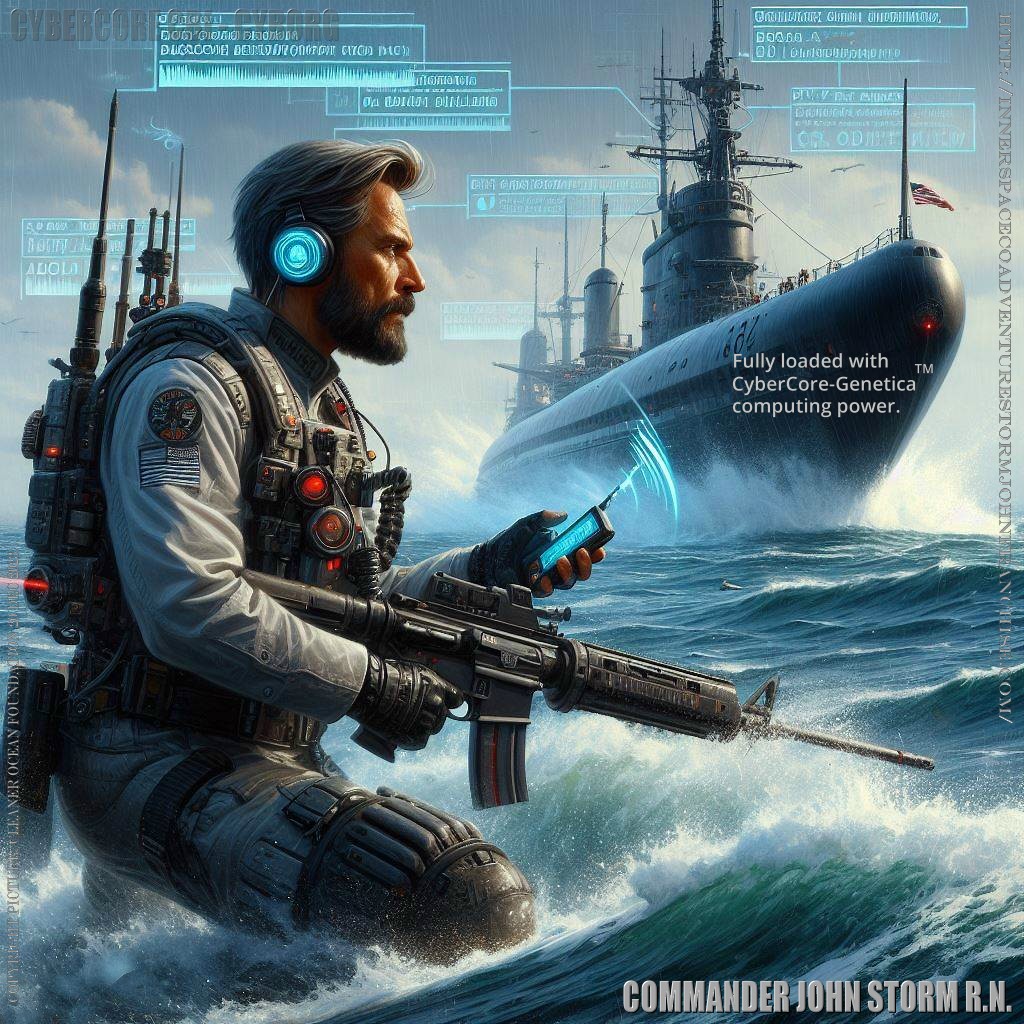
Commander John
Storm just wants to be left alone to complete his DNA collection, and
explore the uncharted regions on planet
earth. But he always seems to be
in the wrong place at the wrong time.
The
Chinese President, Xi
Jinping, is taken hostage as part of the plan
of the extreme activists to destroy all life on planet
earth, to enable them to stage a Phoenix like comeback from the ashes,
and takeover from the leaders they see as weak.
Red
Dragon's plan, 'Operation Grand Slam - Phoenix,' will destroy all civilization,
history and heritage from thousands of years of human endeavor. But they
don't care about that. They just want to rule the world, and to rewrite
history they way they want to see it written. Their plan is write themselves
in as the saviors of the world.
Working
with other like minded cells, the extremists kidnap the Xi Jinping and
other world leaders with nuclear capability. Holding them hostage, until
their evil plan comes to fruition. After which their fate will be decided.
Faced with death, and the realization that he has lost control of his
empire, that will be wiped out and reduced to rubble, Jinping knows that
he must backtrack and seek stability, backed by his former enemies, who
turn out to be his friends in seeking peace. But his aggressive stance
on infiltrating world markets and property acquisitions, are seen by his
cellmates as a stumbling block to paving the way for world peace.
WHAT ASSETS DO CHINA OWN INTERNATIONALLY?
Outside of this theoretical White Paper. What assets do China own internationally, and what key exports, if imports are halted entirely by the nations under military threat, will have the most devastating trade effects. Such as to undermine weapons manufacture for war. Such as China's agenda to have more warships and submarines. Which, without the income from exports, simply cannot be operated for lack of cash?
CHINESE INTERNATIONAL ASSETS
Below is an analysis that steps outside Volodymyr
Zelenskyy and Hal's examination of both China’s internationally held assets and the critical export sectors that fuel its military and industrial ambitions.
Hal concluded that if major importers—especially those under military threat—halt these key imports, the resulting trade shock could severely undermine China’s capacity to fund—and even operate—its aggressive naval and military modernization programs.
With one eye firmly on aggression
China has established a broad portfolio of international investments and strategic assets that underpin its global influence and economic leverage. These include:
Infrastructure and Port Investments: Through initiatives like the Belt and Road, Chinese state‐owned enterprises and investment funds have acquired significant stakes in ports, rail networks, and logistics hubs around the world. For example, strategic ports in Greece (like the Port of Piraeus), in Pakistan (Gwadar), and throughout Africa and Southeast Asia serve not only as revenue generators but also as critical nodes for China’s maritime and trade ambitions.
Resource Extraction and Energy Projects: Chinese companies own or control substantial mining, oil, and gas assets overseas, particularly in Africa, Latin America, and Central Asia. These investments secure access to critical raw materials—such as rare earth elements, copper, and lithium—that are vital for high-tech production as well as military manufacturing.
Real Estate and Financial Assets: Chinese state-backed banks and sovereign wealth funds hold significant investments in key global financial centers and real estate markets. These assets generate steady income and provide an additional channel for exporting capital, but they are also vulnerable to shifts in global trade patterns and international sanctions.
Strategic Technology and Industrial Investments: Numerous Chinese companies have made inroads into advanced manufacturing sectors overseas—including telecommunications, electronics, and industrial machinery. These footholds enable China to access technology, integrate into supply chains, and secure markets for exports that indirectly support its defense industrial complex.
In essence, while China’s international asset portfolio is vast and diversified, it relies heavily on the continued flow of revenue from exports to maintain and expand these investments.
KEY EXPORTS WITH DEVASTATING TRADE IMPACT IF
HALTED
If nations under military threat were to cease importing Chinese goods entirely, several export sectors might deliver particularly harsh blows to China’s economic and military
capacity.
HIGH-TECH INDUSTRIAL MACHINERY ANND COMPONENTS
Relevance to Defense Manufacturing: Much of China’s modern weapons systems—ranging from shipbuilding blocks for warships and
submarines to precision components for missile systems—depend on indigenous production bolstered by revenues from the industrial sector.
Trade Impact: A halt in exports such as computer numerical control (CNC) machines, robotics, and semiconductor fabrication equipment would restrict both civilian industrial output and defense-related manufacturing. Revenue shortfalls could delay or halt critical upgrades in China’s military production lines.
CONSUMER ELECTRONICS & TELECOMMUNICATIONS EQUIPMENT
Dual-Use Technologies: Products such as smartphones, computer components, and networking hardware often incorporate advanced technologies that have both civilian and military applications.
Export Revenues and Innovation: These exports generate significant foreign exchange earnings that help fuel R&D and subsidize dual-use technological development. With a significant drop in sales, the domestic tech sector (and by extension, the military-industrial complex) could face serious cash-flow constraints.
AUTOMOTIVE EXPORTS AND KEY COMPONENTS
Industrial Base Dependencies: The automotive sector and its supply chain are critical in maintaining China’s vast manufacturing infrastructure. This sector not only provides employment and technological expertise but also indirectly supports metalworking, electronics, and precision engineering—sectors integral to assembling complex military hardware like warships and submarines.
Economic Multiplier Effects: If countries were to ban the influx of affordable Chinese vehicles and auto parts, the knock-on effect would be a retraction in industrial production and a loss of capital that currently helps fund military modernization.
RENEWABLE ENERGY TECHNOLOGIES (Solar Panels, Wind
Turbines)
Energy and Competitive Advantage: China currently dominates the global market for
solar panels and other renewable energy
tech, including wind
turbines. These industries support energy security at home but also serve as a key source of export revenue.
Strategic Implications: A sudden halt in these exports would not only damage China’s industrial base but would also constrain its ability to invest in new technologies, including those applied in advanced materials and energy storage systems critical for powering high-energy, modern military systems.
STRATEGIC CONSEQUENCES FOR CHINA'S MILITARY
AMBITIONS
If these export sectors were effectively cut off by nations under military threat, China would confront several cascading challenges:
Reduced Cash Flow for Defense Funding: The loss of export revenue would directly impact China’s ability to finance its expansive naval programs—including the construction and maintenance of warships and
submarines. Without the steady income from these exports, operating such capital-intensive assets becomes financially
unsustainable.
Hindered Technological Upgrades: Modern military platforms depend on constant inflows of revenue to support R&D and to integrate the latest dual-use technologies. If export earnings decline sharply, China’s military modernization efforts would likely stall, reducing its competitiveness in an arms race dynamic.
Strain on International Debt and Investments: With extensive overseas investments now funded by robust export earnings, a sudden economic decoupling could exacerbate existing foreign debts—including those potentially accumulated from IMF borrowing. This would diminish China’s leverage in global markets and diminish its ability to invest in further expanding its military-industrial base.
Ripple Effects on Global Supply Chains: The halting of key Chinese exports would also send shockwaves throughout global supply chains. This disruption could force a rapid realignment of manufacturing bases internationally, further isolating China’s economic influence and undercutting its strategic assets abroad.
CHINESE
ASSETS SUMMARY
In summary, China’s vast international asset portfolio—spanning infrastructure, resource projects, financial investments, and strategic technology holdings—is deeply intertwined with its export-driven revenue model. Key exports in high-tech industrial machinery, consumer electronics, automotive components, and
renewable energy technologies not only bolster China’s manufacturing and defense sectors but also fund its ambitious military programs. Halting these imports would create a severe economic shock, potentially undermining the financial foundations required to support the operation of advanced warships, submarines, and other sophisticated military systems. Ultimately, such a coordinated trade embargo could accelerate the implosion of aggressive military ambitions, highlighting the interdependency between global trade and the ability to wage prolonged conflict.
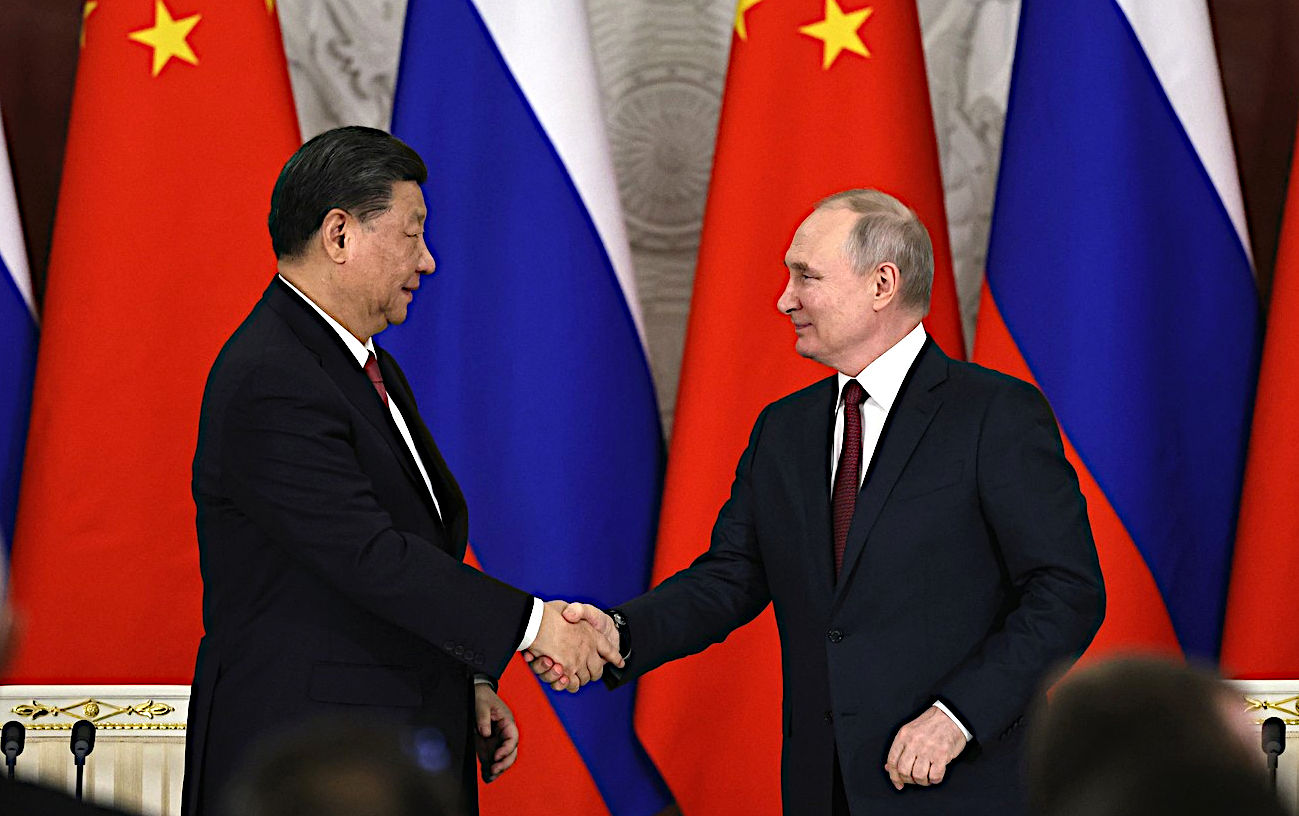
While
captive, his fellow high ranking inmates discover virtues not on display
on the international stage of diplomacy. Xi turns out to have a great
sense of humour. Coming up with potential escape plans, and even being
protective of the other hostages in the face of aggressive and cruel
guards. Xi Jinping undertakes a number of heroic acts while captive,
even saving the lives of his world leader counterparts on one occasion.
These character traits very much impress the inmates of the cramped and
lacklustre conditions they find themselves in, who develop a kinship
that is impossible for a leader of a republic based on communism looking
for recognition on the world stage, even as a perceived new world order
in the making.
When
John Storm rescues the hostages and takes them onboard the Elizabeth
Swann to make their getaway, Jinping engages with his fellow captives,
agreeing to negotiate
a world peace, based on tolerance, fairness and agreements to halt
inflation caused by the unsupported printing of money that in fact had
no real-world value, but caused debt and global
warming.
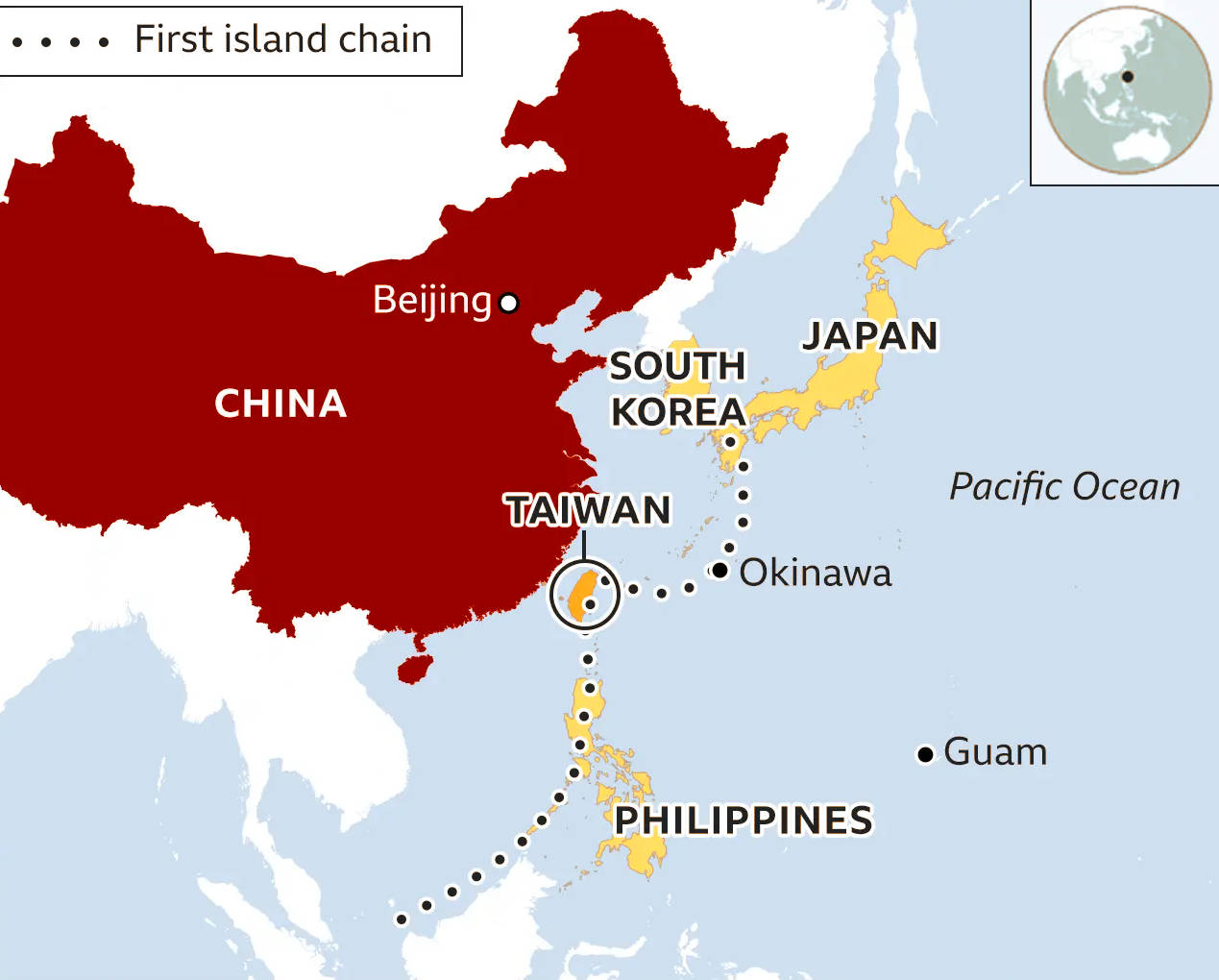
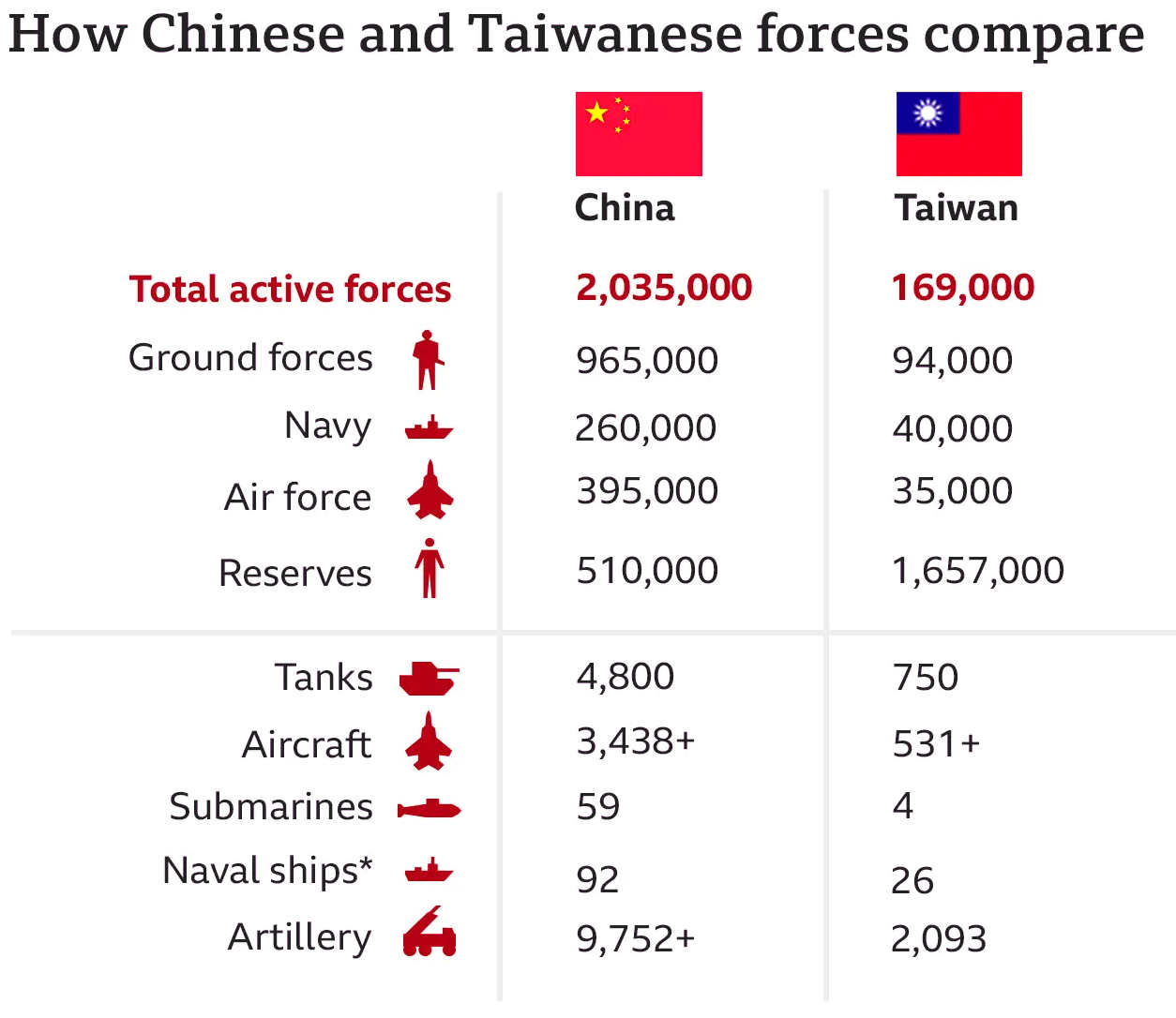
TAIWAN
China has spoken of "peaceful reunification" - a long-term goal to win over the island's
population through soft power and CCP-sponsored messaging that shows unification in a positive light.
But Beijing has also used threats. President Xi Jinping has said "reunification" with the island must be fulfilled and is believed to have a deadline.
In a military confrontation, China's armed forces would dwarf those of Taiwan.
China is the second-biggest spender on defence after the US and could draw on a huge range of capabilities, from naval power to missile technology, aircraft and
cyber
attacks.
Taiwan's economy is another factor. Much of the world's electronics - from phones to electric cars - are powered by computer chips made in Taiwan. By one measure, a single Taiwanese company - the Taiwan Semiconductor Manufacturing Company or TSMC - has over half of the world's market.
So if China takes the island, it could be freer to project power in the western
Pacific and rival the US. Beijing would also have control over an industry that drive the global economy.
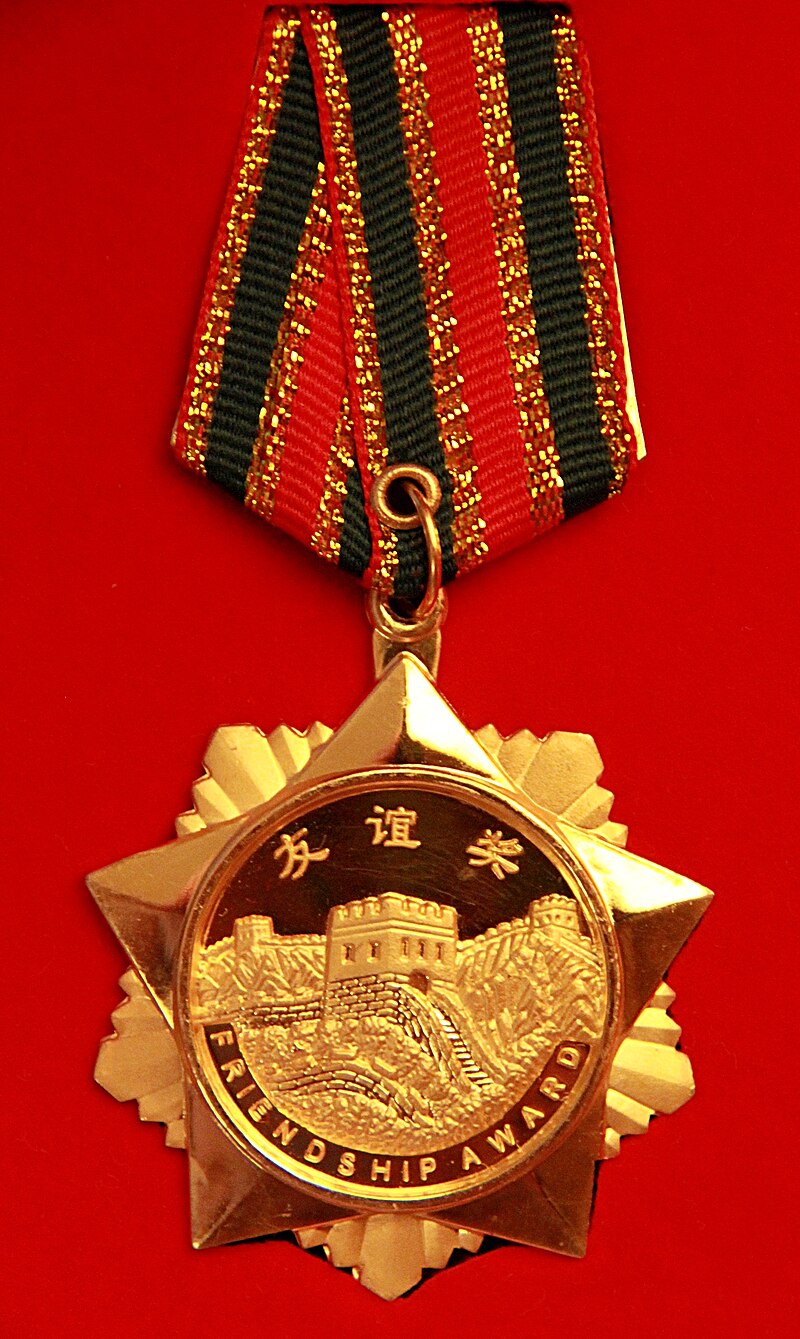
In
this fictional movie China is portrayed positively when the chips are
down, Xi being a force for good, on being freed, cooperating with other nations to stop
other world be Red
Dragons emerging like a Phoenix
from the ashes. Thus resonating with national pride.
The
black-humor of the desperate situation bridges cultural divides. With
lighthearted moments creating a shared experience for audiences globally.
Making temporary friends of former enemies. Some of which rubs off, from the
realization that big arsenals of nuclear weapons are more susceptible to
cyber attacks than previously thought, turning their own weapons against
them.
For
his valour and dogged determination to rescue himself and co-captives, and
in the cause of furthering international relations, Xi Jinping awards John
Storm the People's Republic of China Friendship Award.
CYBER WW3III
CAST:
|
CHARACTERS:
PROTAGONISTS
|
DESCRIPTION
|
|
|
|
|
Admiral
Lawrence Francis Percival
|
First
Sealord, British
Royal Navy
|
|
Antonio
Guterres
|
United
Nations' Secretary General
|
|
Ark,
The
|
The
world's most comprehensive interactive DNA database
|
|
Benjamin
Reid Blakestone RN
|
Submariner
Commander HMS Neptune (Captain)
|
|
BioCore™
|
A
digital communication interface for the human brain
|
|
Captain
Nemo AI™
|
AI
autonomous navigation system, COLREGs
compliant
autopilot
|
|
Charley
Temple
|
Researcher
& camerwoman,
good friend of John Storm
|
|
Cleopatra
Philopator VII Reborn
|
Trish
Lippard is Cleopatra's
call sign to protect her royal identity
|
|
CyberCore
Genetica™
|
The
world's smallest, fastest & most powerful supercomputer
|
|
Daniel
(Dan) Hawk
|
Electronics
& computers, champion
gamer, member
Elizabeth Swann crew
|
|
Dr
Roberta Treadstone
|
Blue
Shield, Newcastle University, England
|
|
Elizabeth
Swann HMHS
British Royal Navy
|
World's
fastest
solar/hydrogen ship & floating laboratory
|
|
Excalibur,
Pendragon & Merlin
|
Anti
piracy weapon & ship security system
|
|
George
Franks
|
Legal
and intelligence trust manager, Swindles
& Gentry
|
|
HAL
AI™
|
The
onboard AI
supercomputer ship manager
|
|
Jack
Mason
|
CIA
secret agent who covets the CyberCore Genetica & John's strength
|
|
Jens
Stoltenberg
|
Secretary
General of NATO (North
Atlantic Treaty Organization)
|
|
Jill
Bird
|
Senior
BBC news
correspondent & world service anchor
|
|
John
Storm
|
Ocean
adventurer, marine
archaeologist, Commander
RN & temp spy
|
|
King
Charles III
|
British
Monarch in waiting: King William, Prince of Wales
|
|
King
William V
|
British
royal rushed into hiding with Queen Catherine
|
|
Mark
Rutte
|
Secretary
General of NATO (North
Atlantic Treaty Organization) from 2024
|
|
Nautilus
|
Elizabeth
Swann's onboard survey ROV
|
|
Professor
Douglas Storm
|
John
Storm's uncle, designer
of Elizabeth Swann
|
|
Professor
Jacques Pierre Daccord
|
UNESCO sunken
realms division, conservationist
|
|
Queen
Catherine
|
Royal
consort to King William V - Charlotte, George & Louis
|
|
Richard
Leon (Lionheart) Engelheart
|
Lieutenant,
a brave
submariner HMS Neptune
|
|
SSN
Neptune
|
Stricken
Astute nuclear sub with Spearfish torpedoes
|
|
Steve
Green
|
Freelance
reporter, friend of Charley Temple
|
|
Suki
Hall
|
A
marine biologist, admirer of John's work
|
|
Tom
Hudson
|
Sky
News Editor, always looking for an exclusive
|
|
William
Liam Wallace
|
Scottish
director BAE Systems, MOD contractor, whistleblower
|
|
CHARACTERS:
ANTAGONISTS
|
DESCRIPTION
|
|
|
|
|
Ali Khamenei
|
Iranian Grand Ayatollah
|
|
Asif
Ali Zardari
|
Prime
Minister of Pakistan
|
|
Chuck
Kowalski
|
Midnight
Sun - military
Triad Cell lead (Americas)
|
|
Donald
Trump
|
Former
45th
President of the United States of America
|
|
Donald
Trump
|
47th
President of the United States of America; global trade
sanctions
|
|
Emmanuel Macron
|
French
President
|
|
Friedrich
Merz
|
German
Chancellor CDU Christian Democratic Union
|
|
General
Reza Shar
|
Red
Dragon triad mastermind, of Operation Grand Slam
|
|
George
W Bush
|
43rd
US President, war on terror, invaded
Iraq on fabricated reports
|
|
Giovanni
Romano
|
Golden
Cage - military
Triad Cell lead (Europe)
|
|
Golden
Cage (Giovanni Romano)
|
Military
Triad Cell covering Europe, French, German & UK targets
|
|
Joe Biden
|
President
USA (46th)
|
|
Harry
(Dirty) Hallem Holland
|
Chief
Constable - Scotland Yard (Metropolitan Police)
|
|
Kamala
Harris
|
47th
President of the United States, Democrat candidate
|
|
Katya
Volkov
|
Russian
intelligence FSB double agent, would be defector
|
|
Keir Starmer
|
British
Prime Minister
|
|
Kim Jong Un
|
Supreme leader North Korea
|
|
Marine
Le Pen
|
French
Prime Minister
|
|
Midnight
Sun (Chuck Kowalski)
|
Military
Triad Cell covering American and Canadian targets
|
|
Narendra Modi
|
Prime
Minister of India
|
|
Nadia Petrova
|
Former
KGB agent helping Katya and John anonymously
|
|
Nick
(The Devil) Johnson MP
|
Corrupt
UK
Minister for Defence, oil investor
|
|
Olaf Scholz
|
German
Chancellor
|
|
Red
Dragon (Reza Shar)
|
Military
Triad Cell covering Africa, Asia, Iran, Russia & N Korean
CRINKs
|
|
Saddam
Hussein
|
Iraqi
proponent of a united Arabia, executed for HR
crimes & cheap oil
|
|
Sir
Rodney Vernon Dunbar
|
MI6
military intelligence (General)
oil investor
|
|
Tim
Waltz (Top
Gun)
|
Governor
of Minnesota,
(Top
Gun) running mate with Kamala Harris
|
|
Tony Blair
|
Former
British PM, invaded Iraq on false intelligence
|
|
Vladimir Putin
|
Russian
President
|
|
Volodymyr
Zelenskyy
|
Ukrainian
President, tough fighter, adaptable drone warfare king
|
|
Xi Jinping
|
President
People's Republic of China
|
|



